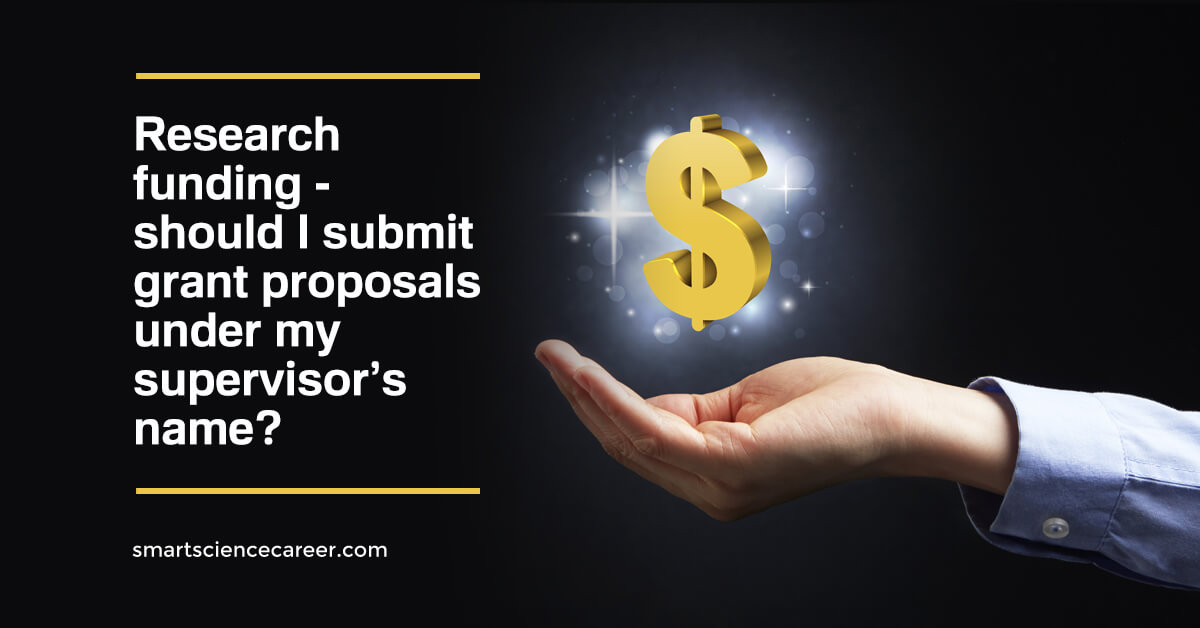RESEARCH FUNDING – SUBMIT PROPOSALS UNDER MY SUPERVISOR’S NAME?
Raising research funding is an essential skill that makes you attractive for positions in industry and academia. However, at the beginning of your career, you are often not eligible, and you are confronted with a dilemma: Either risk not getting the grant or submitting it under the name of your supervisor. What should you do?
Raising research funding is an essential skill that makes you attractive for positions in industry and academia
The best predictors for a successful scientific career are your publication list and the ability to raise research funding.
This is particularly true when you want to become a faculty member in an academic institution. Learn more about the steps to becoming a faculty member in these articles: How to become a professor? and Am I doing enough for my scientific career?
When you apply successfully for personal grants as a Ph.D. student, this will be considered a label of excellence and make you more attractive for industry and academic positions.
This is also the case for postdocs: securing external funding for your research project via successful grant applications is a label of excellence and promotes your career in science.
Presenting yourself as a successful grant applicant in the past makes you more attractive as a current applicant for a postdoctoral fellowship or a future position.
In addition, you may win project grants to pay for expensive consumables and invest in better instruments and technologies.
You may even hire a technician or research assistant. You may also fund Master’s and Ph.D. students who will generate a lot of data for you.
Raising industry money makes you an attractive candidate for the industry partner because they get to know you, and you can build trust. It also shows other companies that you understand how research is handled in the industry.
Writing many grant proposals increases your chances to get research funding
In a way, getting funds is a numbers game. The more you apply, the better your chances of success. However, writing grant proposals costs a lot of time. Thus, you must become efficient and improve your writing.
I wrote another article on how to write your publications faster – it may also help you write more and better applications for research funding.
Should I apply for research funding under my own name or my supervisor’s name?
Briefly, if your publication list is already excellent, you should apply under your own name.
If you are still in the beginning, you may consider applying for personal grants and small project funding under your own name.
However, if you have doubts about your publication list, you may consider applying for bigger project grants under your supervisor’s name.
Apply for personal grants
If your performance, especially your publication list, is good to excellent, you should apply for multiple personal grants. However, this type of research funding typically pays your salary and often includes only limited grants for consumables.
A successful grant application will make you more attractive as a candidate for a panel that evaluates proposals for funding or for a faculty committee selecting candidates for academic positions (PhD student, postdoc, academic staff, professor).
Finally, your supervisor may be happy in such situations because the money for your current salary can be used elsewhere, for example, for a new staff member or consumables.
Apply for starting grants at the beginning of your research career
If you have a fantastic publication list, there is a good chance that you may receive more significant research funding. You may be particularly successful when you go for those funding schemes intentionally created to support early career scientists and “rising stars.”
Most research councils (or other funding bodies) have “starting grants.” These help young scientists start their careers in science, start their own labs, become independent researchers, and become established in the research community (depending on their career stage).
Apply for small grants under your own name
You may doubt whether you are good enough for a career in science. You may still not know what the best publication strategy is for you. No matter your doubts, you should consider starting to write grant proposals.
Applying for multiple small grants is a clever strategy at the beginning of your career because the success rate is often much higher compared to bigger grants.
The big stars in the field may avoid the smaller grants because the investment return is smaller; thus, the time invested is not worth the funding they get. This is good news for young scientists because they do not compete with the “big guys” with a fantastic publication list.
In addition, it may be a good time in your scientific career to apply for these funding schemes. The eligibility criteria of small grants may even explicitly exclude senior scientists, for example, based on “time after graduation. Thus, again, you have a higher chance of getting these smaller grants.
Sometimes, the requirements are minimal. For example, you may have to submit a personal statement, letter of intent, or faculty recommendations to an email address. In the worst case, all you can get is a “no.” In the best case, you are allowed to submit a proposal.
You may apply for funding for your thesis work within your institution or externally. Again, successful applicants are more attractive for future positions and grants.
Similarly, you may apply for travel awards within or externally from your institution. If you get them, they make your CV a tiny bit more attractive to potential future employers. Even undergraduate students can apply for grants for creative projects.
As a rule of thumb, every little grant you get will be seen as a label of excellence, even if you only get a few thousand Dollars or Euros.
Apply for big project grants under your supervisor’s name
It is never advised in eligibility requirements. Nevertheless, if your publication list is good but not excellent, or if your publication list is still very short, you might apply the following strategy.
It might be clever to write bigger project grant proposals and submit them under the name of your supervisor to a funding agency.
You will not find any information about this in the program guidelines or specific instructions. Staff members of the funding body may actually advise you not to do that and apply under your own name, but then you do not get the grant because your publication list is too weak or you are not eligible at your career stage.
The advantages are clear. Your supervisor probably has a much longer and, hopefully, much better publication list, demonstrates a lot of technical and organizational expertise, and has a broad international network. This dramatically increases your chance of getting the funding.
The disadvantages are also apparent. Your supervisor may use the money for other projects, hire persons who work for them, and improve their output and career instead of yours. Thus, only do it when you trust your supervisor.
If your faculty supervisor is paying your salary, they may consider every aspect of your creative activity as their output. Thus, negotiate this early and the process and document it in a timely manner.
However, if your supervisor is fair, you may initially negotiate that the funding is used for your projects and resulting papers on which you are the first author – provided you have written (most of) the proposal. Probably, your supervisor will agree because they will be a co-author or the senior author of all resulting publications anyway.
Discuss your grant writing strategy carefully with your supervisor
If you have a good relationship with your supervisor, you should openly discuss your ambitions and explicitly ask for support to learn grant writing by getting a lot of feedback. You should agree on a healthy balance between experimental research, writing papers, and writing grant proposals.
As a supervisor, I talk to a lot of people and make many agreements. I know from experience that I may forget details of discussions (like many supervisors 😊). Therefore, I always document the agreements’ key points, at least in an email. So should you. Thus, do it the right way and document the agreements in writing.
Learn research grant writing by getting a lot of feedback
To improve your grant writing, you should follow these strategies:
1. Avoid the biggest mistakes of young scientists. Read about and avoid the typical mistakes most young scientists make when writing their first grant proposals.
2. Read a book about grant writing. There are only a few good books on the market. I would suggest „The Only Grant-Writing Book You’ll Ever Need“ by Ellen Karsh (affiliate link).
3. Participate in any grant writing workshop you can find. There are many possibilities. Courses organized by your university, online seminars, or grant writing sessions during scientific meetings. You may also ask your university administration whether they are willing to fund and organize such a workshop.
In such a workshop, you may be pushed to write a grant application and get detailed feedback. Since this again may cost some of your working time (which you could spend in the lab) you should get approval from your supervisor or do it in your free time.
4. Ask your supervisor to contribute to every research proposal to get corrections and feedback. It is a strategic mistake if you are the only person who reads the grant proposal before submission.
The first time, it is more work for your supervisor, but later, you will contribute a lot because you know precisely what they want, how they want to write it, and what the strategy is. This gives you deep insight into the application process in your field. In addition, you do a good job in your current position. Start with grant writing during your PhD or your first postdoc.
5. Ask your supervisor and trustworthy colleagues for feedback on your research proposals. You might be embarrassed. You might be afraid that your ideas will get stolen. However, getting constructive feedback on a proposed project from others is essential to improve your writing.
Your thesis advisor or a faculty advisor can help you to enhance your project and avoid omitting key information. I have written probably hundreds of grant applications, and still, I make stupid mistakes and omissions.
- Oops, there is no clearly stated hypothesis.
- Oops, information about the qualifications of the principal investigator or intellectual property is missing.
- Oops, alternative funding, conflicts of interest, or the ethics about included human subjects are not sufficiently described.
- Oops, is the proposal well-aligned with the course of the student and the previous publications of the research group?
- Oops, is there a reference letter missing?
Experienced grant writers will make you aware of your blind spots. It is essential for a successful application. Thus, always give your proposals to at least two other persons for input and feedback.
6. Ask the research office of your institution for feedback. They often can provide additional information and give tips about best practices because they have already taken care of many other grant proposal submissions.
7. Attend seminars of funding agencies – and confirm the information later. Most funding agencies organize meetings to inform about their funding principles and the application rules. Research institutes may invite representatives of the most critical funding bodies to inform their staff members.
But be careful. Staff members of a funding institution may have a different perspective than the actual reviewers and scientific members of a review committee.
The information about the selection process and selection criteria from staff members who do not participate in the selection procedure may differ from the information you get from scientists who are actually part of the selection committees.
However, these meetings help to understand many aspects you might not think about. The following criteria may be aspects to clarify during such meetings:
- Are your research ideas in the scope of the program? Does the proposed research fit with the highest priority of the funding scheme?
- Are you or your institution eligible to apply?
- Can you apply at your current career level as a grad student, postdoc, tenure-track professor, or senior scientist?
- Are there national or international regulations. For example, do you need to be a U.S. citizen to apply for an NHI grant, a Canadian for a CIHR fellowship, or a German for DFG funding? Or can anybody apply?
- When is the application deadline? Eastern time or another time zone?
- When will be the next call? Any information about the future availability of funds?
- Is it required that the projects are associated with graduate programs? Do you need to organize a summer course in the spring semester? How to describe it sufficiently?
- What do you need for a complete application? Where to download the correct application form? Do you need letters of recommendation? Do you need to provide specific details about ethics, biosafety, or available infrastructure? Is a very detailed budget requested? Is there a page limit?
- Are funds included for participant compensation or indirect costs such as international travel to scientific meetings?
- How much is your own salary paid by such a grant scheme?
- What are the total award and the overhead for your institution?
Conclusion
Apply for as many grants as possible because getting even a small grant is a label of excellence. Carefully discuss your grant writing strategy with your supervisor to get support and avoid conflicts.
Acknowledgements
I have used AI systems, including Grammarly, Google Gemini, and ChatGPT, to enhance the English and comprehensiveness of this article. This post may contain affiliate links, meaning I get a small commission if you decide to purchase through my link. Thus, you support smartsciencecareer at no cost to you!
Recommended reading
The following articles may also interest you:
- Seven deadly sins that kill your grant proposal
- Am I good enough for a career in science?
- Am I doing enough for my scientific career?
- Do I need nature or science papers for a successful career in science?
- What is the best publication strategy in science?
- 10 simple strategies to increase the impact factor of your publication
- Should I aim for multiple co-authorships to extend my publication list?
- Should I aim for co-authorships on high impact papers?
- Should I have senior authorships as a postdoc?
- How to become a professor?
- What is tenure?
- Why salary matters in science careers



